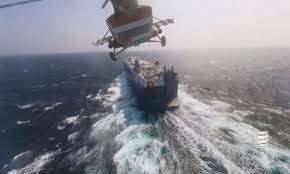
In a realm where the intricate equilibrium of worldwide commerce is often overlooked, recent occurrences in the Red Sea have propelled the global community into a state of heightened urgency. The Red Sea, a pivotal maritime conduit responsible for facilitating 10-15% of the planet’s trade, is grappling with the reverberations of Houthi assaults. Global leaders and entities are now collaboratively engaging in navigating an intricate labyrinth of challenges that extend beyond mere economic considerations.
The Trade Tapestry of the Red Sea:
The Red Sea, historically renowned for bridging continents and fostering international trade, has now become a nucleus of apprehension. Recent Houthi assaults on commercial vessels navigating this strategic waterway have triggered a series of disruptions, sparking what can only be characterized as a maritime crisis. Industry behemoth BP, among others, has been compelled to cease shipments through the Red Sea, underscoring the gravity of the situation and the tangible repercussions on major corporations.
Global Supply Chains in Turmoil:
The Red Sea crisis has sent shockwaves across global supply chains, imperiling the stability of one of the world’s most traversed shipping lanes. As trade routes confront unprecedented challenges, anxieties about the resilience of global supply chains have surged. The ramifications extend beyond the entities directly engaged in Red Sea trade, reaching sectors reliant on the seamless conveyance of goods.
Maritime Crisis and its Expanding Ripples:

A maritime crisis, reminiscent of historical disruptions such as the Panama Canal blockade, has manifested in the Red Sea. This crisis has birthed congestion and delays, disrupting the flow of commodities and goods on a global scale. The cascading effects of these disruptions necessitate swift and efficacious measures to reinstate the regularity of trade routes, underscoring the imperative for international cooperation and a unified strategy to address the challenges at hand.
Corporate Titans at a Precipice:
In response to escalating Houthi assaults, major vessel owners are actively steering clear of Red Sea voyages, compounding the intricacy of the situation. This avoidance not only impacts freight expenses but also contributes to the volatility of energy prices. Approximately 12% of the world’s trade transits through the Suez Canal, amplifying the gravity of the challenge and the urgency for strategic interventions.
Pentagon’s Global Endeavor:
Acknowledging the pivotal role of the Red Sea in global trade, the Pentagon has unveiled a new international mission aimed at countering assaults on commercial vessels. This move underscores the significance of a coordinated and collaborative approach to ensure the security of maritime routes and reinstill confidence among shipping companies.
The exigency of Restoring Red Sea Trade:
The urgency to recommence Red Sea trade is not merely a matter of economic import; it is a question of global economic well-being. The Red Sea serves as a conduit for 10-15% of all global trade, playing a pivotal role in the global grain trade with an 8% share and the seaborne oil trade with a substantial 12% share. The disruptions caused by Houthi assaults imperil not only the economic prosperity of nations but also the stability of critical global supply chains, demanding immediate attention and concerted endeavors to find sustainable solutions.
International Cooperation for a Sustainable Resolution:
Amidst the challenges, diplomatic channels are being explored to address the root causes of the conflict and ensure an environment conducive to safe and secure maritime activities. Global leaders are engaging in dialogues to foster international cooperation and coordination, emphasizing the need for a united front against threats to maritime security. The collaborative efforts aim to not only alleviate the immediate impacts of the crisis but also lay the groundwork for a more resilient and secure global trade environment.
Economic Ramifications and the Path Ahead:
The economic repercussions of the disruptions in Red Sea trade cannot be understated. The suspension of shipments, the surge in freight costs, and the volatility in energy prices all contribute to a daunting economic landscape. As global leaders and entities strive to resume Red Sea trade, a comprehensive strategy that addresses both immediate security concerns and long-term stability becomes paramount. The synergy between governments, international organizations, and private enterprises will play a pivotal role in crafting sustainable solutions and mitigating the risks associated with the present crisis.

In summation, the concerted efforts to reinstate Red Sea trade mirror the global acknowledgment of the strategic significance of this maritime corridor. The challenges posed by Houthi assaults necessitate a unified and proactive response from the international community. The restoration of normalcy in the Red Sea is not only vital for the entities directly engaged but is also integral to the health and resilience of the global economy. As endeavors intensify, the world observes closely, anticipating a prompt resolution and a return to the uninterrupted flow of global trade through the Red Sea.










